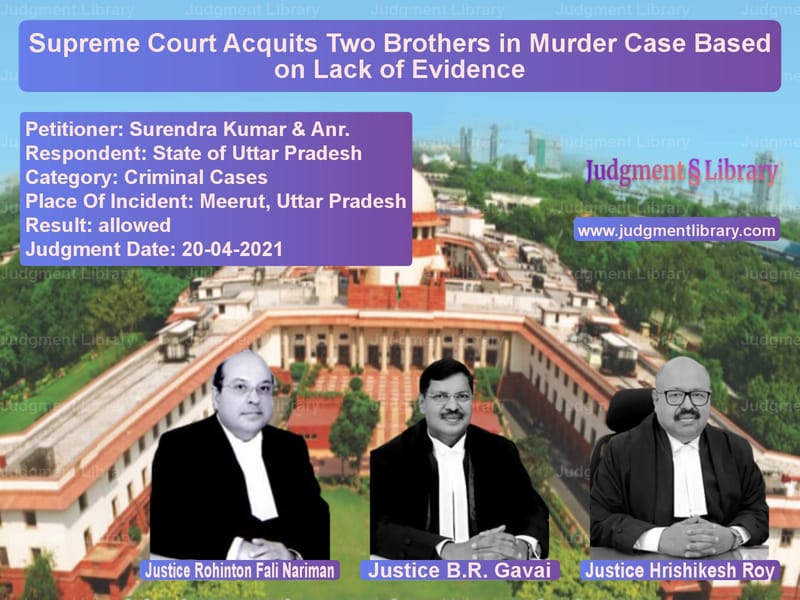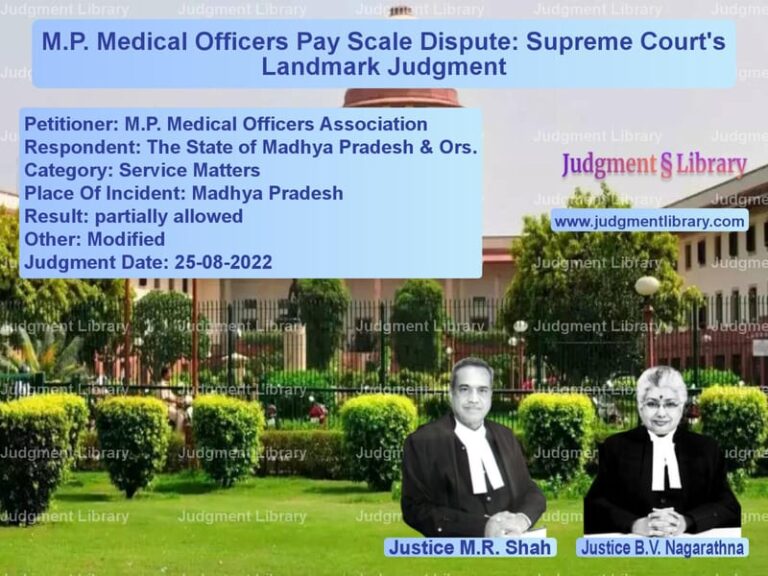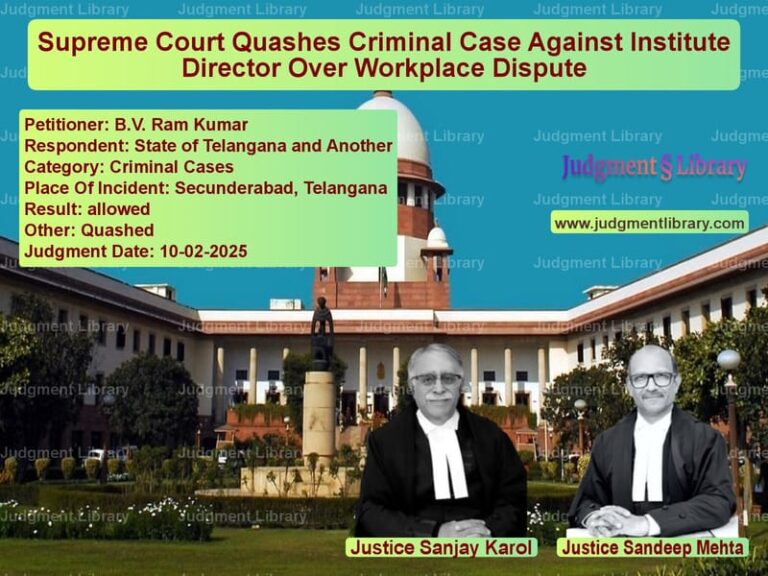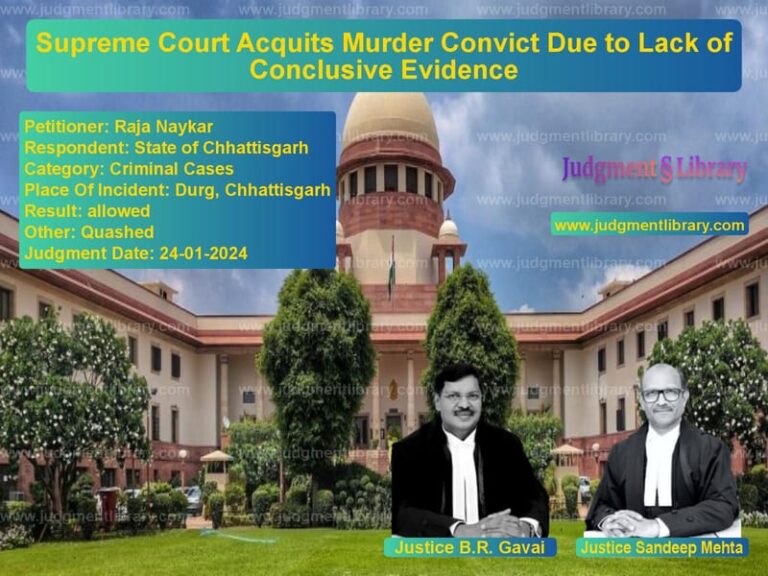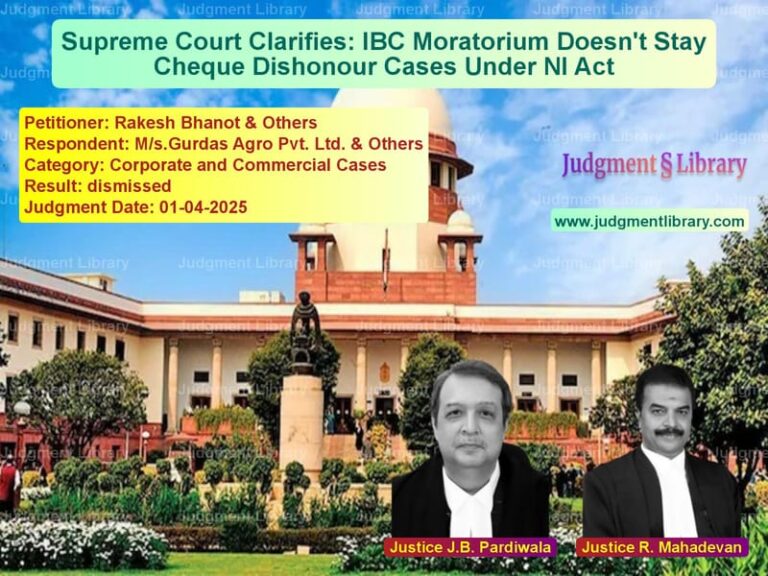Supreme Court Acquits Two Brothers in Murder Case Based on Lack of Evidence
The Supreme Court of India has delivered a significant judgment in Surendra Kumar & Anr. v. State of Uttar Pradesh, overturning the conviction of two brothers who were accused of murdering a young woman named Kamla Rani. The case, which had been in litigation for more than two decades, revolved around circumstantial evidence and allegations of conspiracy.
Background of the Case
The case stems from an incident on August 8, 1993, when Kamla Rani, a recently married woman, was traveling back to her matrimonial home on a scooter driven by her brother-in-law, Surendra Kumar. During the journey, two armed miscreants allegedly ambushed the vehicle, dragged Kamla Rani into a sugarcane field, shot her dead, and robbed her of her jewelry. Surendra Kumar later informed her father, Baldev Singh, about the attack.
The police initially detained Surendra Kumar and his brother Ramveer, suspecting them of conspiring to kill Kamla Rani. They were later charged under Sections 302 and 120B of the Indian Penal Code (IPC). Two additional accused, Shiv Kumar and Rajveer, were charged with robbery and murder.
Petitioner’s Arguments (Surendra Kumar & Ramveer)
- The appellants argued that there was no direct evidence against them and that the case was entirely based on circumstantial evidence.
- They contended that the prosecution failed to establish a conspiracy between them and the two armed robbers.
- They pointed out that Surendra Kumar had immediately informed Kamla Rani’s father about the attack, which was not the conduct of a guilty person.
- They argued that their conviction was based on assumptions rather than solid evidence.
Respondent’s Arguments (State of Uttar Pradesh)
- The prosecution relied on circumstantial evidence, asserting that the appellants had a motive to murder Kamla Rani.
- The prosecution argued that Surendra Kumar’s behavior was suspicious, as he did not resist the attackers or suffer any injuries.
- The prosecution also presented witness testimonies suggesting that Ramveer was unhappy with his wife, which allegedly motivated the conspiracy.
- It was claimed that Surendra Kumar was the last person seen with the deceased and should be held accountable for the crime.
Supreme Court’s Analysis and Judgment
The Supreme Court examined the evidence presented and noted several inconsistencies in the prosecution’s case. The key observations made by the Court included:
- “The burden of proof in criminal cases lies with the prosecution, and it must establish guilt beyond a reasonable doubt.”
- “The mere fact that the accused was last seen with the deceased does not establish guilt unless supported by additional conclusive evidence.”
- “Suspicion, no matter how strong, cannot replace proof in criminal trials.”
- “The theory of conspiracy must be backed by evidence showing a meeting of minds, which is missing in this case.”
The Court ruled that the prosecution failed to establish the involvement of the accused beyond reasonable doubt. The testimonies of key witnesses (PW1 and PW2) did not implicate the appellants, and the prosecution’s reliance on the theory of last-seen evidence was not sufficient for conviction.
Accordingly, the Supreme Court set aside the conviction of Surendra Kumar and Ramveer, ordering their immediate release.
Impact of the Judgment
This ruling sets a precedent in cases based on circumstantial evidence, emphasizing the need for concrete proof rather than mere suspicion. It also highlights the importance of a fair trial and the necessity of ensuring that convictions are based on irrefutable evidence.
The judgment reinforces the principle that an accused person cannot be convicted merely because they were the last person seen with the victim. The ruling also underscores the significance of proving criminal conspiracy with tangible evidence rather than speculative theories.
Conclusion
The Supreme Court’s decision in Surendra Kumar & Anr. v. State of Uttar Pradesh serves as a crucial reminder that criminal convictions must be based on clear and convincing evidence. The Court’s emphasis on safeguarding the rights of the accused and preventing wrongful convictions will have long-lasting implications for the criminal justice system in India.
Petitioner Name: Surendra Kumar & Anr..Respondent Name: State of Uttar Pradesh.Judgment By: Justice Rohinton Fali Nariman, Justice B.R. Gavai, Justice Hrishikesh Roy.Place Of Incident: Meerut, Uttar Pradesh.Judgment Date: 20-04-2021.
Don’t miss out on the full details! Download the complete judgment in PDF format below and gain valuable insights instantly!
Download Judgment: surendra-kumar-&-anr-vs-state-of-uttar-prade-supreme-court-of-india-judgment-dated-20-04-2021.pdf
Directly Download Judgment: Directly download this Judgment
See all petitions in Murder Cases
See all petitions in Bail and Anticipatory Bail
See all petitions in Judgment by Rohinton Fali Nariman
See all petitions in Judgment by B R Gavai
See all petitions in Judgment by Hrishikesh Roy
See all petitions in allowed
See all petitions in supreme court of India judgments April 2021
See all petitions in 2021 judgments
See all posts in Criminal Cases Category
See all allowed petitions in Criminal Cases Category
See all Dismissed petitions in Criminal Cases Category
See all partially allowed petitions in Criminal Cases Category

